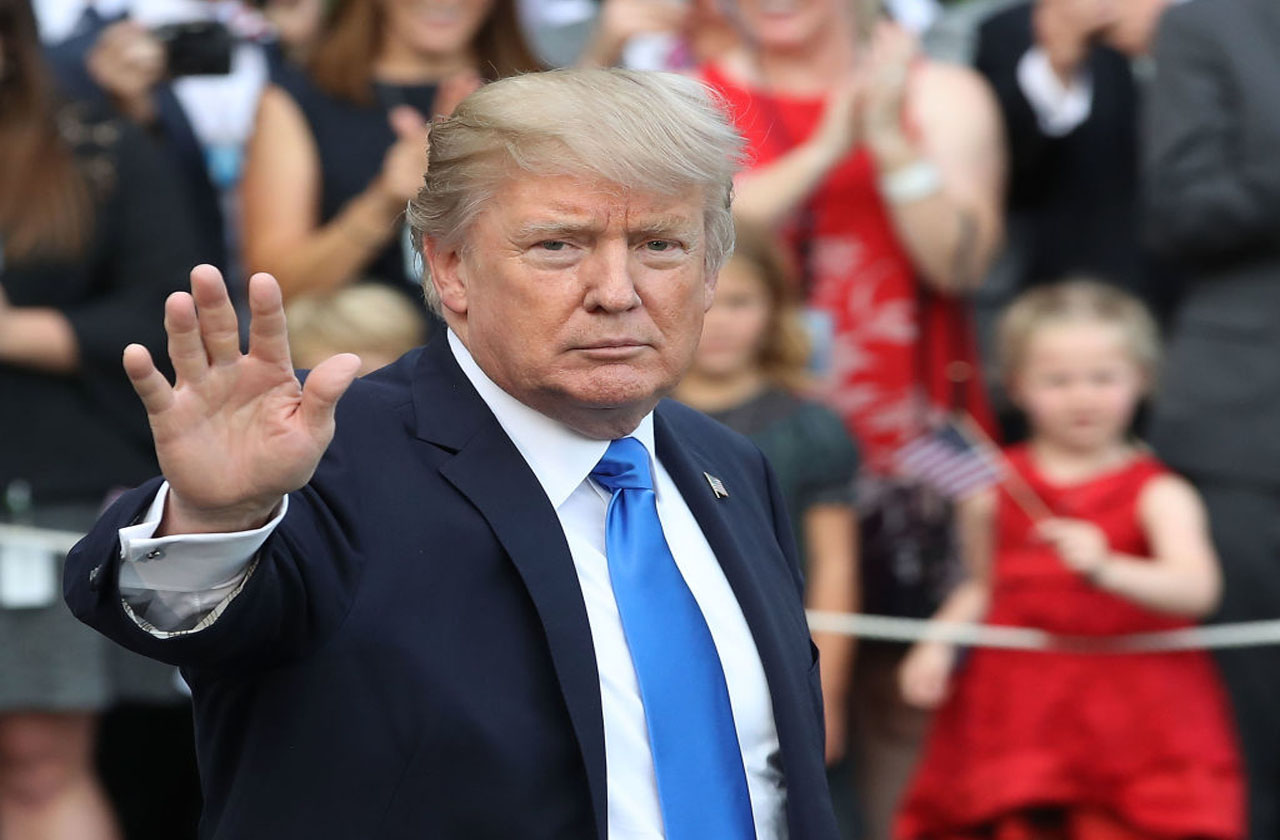Why the ‘Trump Effect’ Continues to Affect Us
Trying to predict what the markets are going to do is often a losing bet. Investors need to filter out the hype and focus on their plan.


Profit and prosper with the best of Kiplinger's advice on investing, taxes, retirement, personal finance and much more. Delivered daily. Enter your email in the box and click Sign Me Up.
You are now subscribed
Your newsletter sign-up was successful
Want to add more newsletters?

Delivered daily
Kiplinger Today
Profit and prosper with the best of Kiplinger's advice on investing, taxes, retirement, personal finance and much more delivered daily. Smart money moves start here.

Sent five days a week
Kiplinger A Step Ahead
Get practical help to make better financial decisions in your everyday life, from spending to savings on top deals.

Delivered daily
Kiplinger Closing Bell
Get today's biggest financial and investing headlines delivered to your inbox every day the U.S. stock market is open.

Sent twice a week
Kiplinger Adviser Intel
Financial pros across the country share best practices and fresh tactics to preserve and grow your wealth.

Delivered weekly
Kiplinger Tax Tips
Trim your federal and state tax bills with practical tax-planning and tax-cutting strategies.

Sent twice a week
Kiplinger Retirement Tips
Your twice-a-week guide to planning and enjoying a financially secure and richly rewarding retirement

Sent bimonthly.
Kiplinger Adviser Angle
Insights for advisers, wealth managers and other financial professionals.

Sent twice a week
Kiplinger Investing Weekly
Your twice-a-week roundup of promising stocks, funds, companies and industries you should consider, ones you should avoid, and why.

Sent weekly for six weeks
Kiplinger Invest for Retirement
Your step-by-step six-part series on how to invest for retirement, from devising a successful strategy to exactly which investments to choose.
It’s kind of fun to watch the ways the stock market moves, and then theorize about what’s happening and why.
But if you’re reacting to each new “expert opinion” when managing your own portfolio, or examining every trend and pattern, well … good luck. It’s folly to imagine you can outguess the greed, optimism, fear and other emotions of Wall Street and your fellow investors.
How Wall Street Got the Election Wrong
Take, for example, the so-called Trump Effect, when stocks soared after the presidential election and then continued to produce record-setting highs.
From just $107.88 $24.99 for Kiplinger Personal Finance
Become a smarter, better informed investor. Subscribe from just $107.88 $24.99, plus get up to 4 Special Issues

Sign up for Kiplinger’s Free Newsletters
Profit and prosper with the best of expert advice on investing, taxes, retirement, personal finance and more - straight to your e-mail.
Profit and prosper with the best of expert advice - straight to your e-mail.
It all seems pretty logical now, with a businessman-turned-president who is expected to cut taxes, roll back financial regulations and, in general, be corporate- and investor-friendly. But that giddy market optimism certainly wasn’t what most experts were predicting before the election.
In contrast with what’s going on today, going into 2016, there didn’t seem to be a lot of confidence in the markets, here or globally, regardless of who the presidential candidates might be. Chinese markets actually used their “circuit-breaker” system multiple times, thereby suspending their markets, because things were so volatile. In the U.S., the S&P was down 5%, the Dow was down over 5.5% and small stocks as measured by the Russell 2500 Index were down 8%.
By all measures, it seemed the party was over and the bull market that started in 2009 finally might be running out of steam just as the election was getting close.
Conventional Wisdom Goes Awry
After the conventions, Hillary Clinton seemed to be Wall Street’s lesser of two evils: The market likes certainty — or so the conventional wisdom goes — and with her, at least you knew what to expect. Donald Trump was a wild card, the talking heads said. (And Clinton had a 90%-plus chance of winning, they told us.)
Of course, each party was predicting that if the other won, it would take the economy over a fiscal cliff. And even before the election, investors were wondering if they should just get out.
So, the election-night surprise was Trump’s win, and not the futures market’s reaction. According to CNN Money, Dow futures dove 870 points at 12:10 a.m., about a half-hour after Trump was projected to win Florida. (To put that into context, on the worst day in 2008, that number was 800.)
And yet, by the time Trump gave his victory speech, things had rebounded somewhat, and the day after the election, the Dow finished up 257 points. That means the total swing in about a 12-hour period was 1,000-plus points, or more than 5.5%.
Investors’ Worst Enemy: Themselves
Since the election, the S&P is up over 10%, as of early July; the Dow is up over 12%, and the Russell 2500 is up almost 12%. And all those people who tried to guess at what to do just before and just after the election? A lot of them likely guessed wrong — selling low and then buying high to get back in.
Now, this may be one of the more well-known and recent examples of a profound market mood swing, but phenomena like the Trump Effect are not at all unusual.
According to the most recent Dalbar study, the 2016 “Quantitative Analysis of Investor Behavior,” the main reason investors who participate in the markets underperform over time is psychology, due to behaviors such as panic selling and herding.
In other words, trying to time the market hurts far more than it helps.
No More Knee-Jerks … Take a Long-Term Approach
Why are investors so skittish? Information overload. We have so much information to sift through, it’s almost impossible to decide what’s good and what’s biased. And you can’t turn it off. It’s like trying to diet on a cruise ship.
We end up forming an opinion based on what we feel, and we tend to opinion shop until we find a financial professional who matches our preconceived biases, without really knowing that person’s track record or what information he or she has.
That’s why, these days, for financial professionals, educating our clients has to be one of our top goals. Your adviser should be coaching you and monitoring your plan, making sure your risk level is appropriate for your situation and helping you navigate through conflicting signals.
Because, as you can see from the Trump Effect, the markets can move really quickly — for reasons that sometimes can, but often cannot, be predicted or explained.
Kim Franke-Folstad contributed to this article.
Profit and prosper with the best of Kiplinger's advice on investing, taxes, retirement, personal finance and much more. Delivered daily. Enter your email in the box and click Sign Me Up.

Blake Morris is a CERTIFIED FINANCIAL PLANNER™ professional with The Lloyd Group Inc., based in Suwanee, Ga., where he develops customized plans for retirees and soon-to-be retirees. Blake is licensed to sell insurance.
-
 How Much It Costs to Host a Super Bowl Party in 2026
How Much It Costs to Host a Super Bowl Party in 2026Hosting a Super Bowl party in 2026 could cost you. Here's a breakdown of food, drink and entertainment costs — plus ways to save.
-
 3 Reasons to Use a 5-Year CD As You Approach Retirement
3 Reasons to Use a 5-Year CD As You Approach RetirementA five-year CD can help you reach other milestones as you approach retirement.
-
 Your Adult Kids Are Doing Fine. Is It Time To Spend Some of Their Inheritance?
Your Adult Kids Are Doing Fine. Is It Time To Spend Some of Their Inheritance?If your kids are successful, do they need an inheritance? Ask yourself these four questions before passing down another dollar.
-
 The 4 Estate Planning Documents Every High-Net-Worth Family Needs (Not Just a Will)
The 4 Estate Planning Documents Every High-Net-Worth Family Needs (Not Just a Will)The key to successful estate planning for HNW families isn't just drafting these four documents, but ensuring they're current and immediately accessible.
-
 Love and Legacy: What Couples Rarely Talk About (But Should)
Love and Legacy: What Couples Rarely Talk About (But Should)Couples who talk openly about finances, including estate planning, are more likely to head into retirement joyfully. How can you get the conversation going?
-
 How to Get the Fair Value for Your Shares When You Are in the Minority Vote on a Sale of Substantially All Corporate Assets
How to Get the Fair Value for Your Shares When You Are in the Minority Vote on a Sale of Substantially All Corporate AssetsWhen a sale of substantially all corporate assets is approved by majority vote, shareholders on the losing side of the vote should understand their rights.
-
 How to Add a Pet Trust to Your Estate Plan: Don't Leave Your Best Friend to Chance
How to Add a Pet Trust to Your Estate Plan: Don't Leave Your Best Friend to ChanceAdding a pet trust to your estate plan can ensure your pets are properly looked after when you're no longer able to care for them. This is how to go about it.
-
 Want to Avoid Leaving Chaos in Your Wake? Don't Leave Behind an Outdated Estate Plan
Want to Avoid Leaving Chaos in Your Wake? Don't Leave Behind an Outdated Estate PlanAn outdated or incomplete estate plan could cause confusion for those handling your affairs at a difficult time. This guide highlights what to update and when.
-
 I'm a Financial Adviser: This Is Why I Became an Advocate for Fee-Only Financial Advice
I'm a Financial Adviser: This Is Why I Became an Advocate for Fee-Only Financial AdviceCan financial advisers who earn commissions on product sales give clients the best advice? For one professional, changing track was the clear choice.
-
 I Met With 100-Plus Advisers to Develop This Road Map for Adopting AI
I Met With 100-Plus Advisers to Develop This Road Map for Adopting AIFor financial advisers eager to embrace AI but unsure where to start, this road map will help you integrate the right tools and safeguards into your work.
-
 The Referral Revolution: How to Grow Your Business With Trust
The Referral Revolution: How to Grow Your Business With TrustYou can attract ideal clients by focusing on value and leveraging your current relationships to create a referral-based practice.